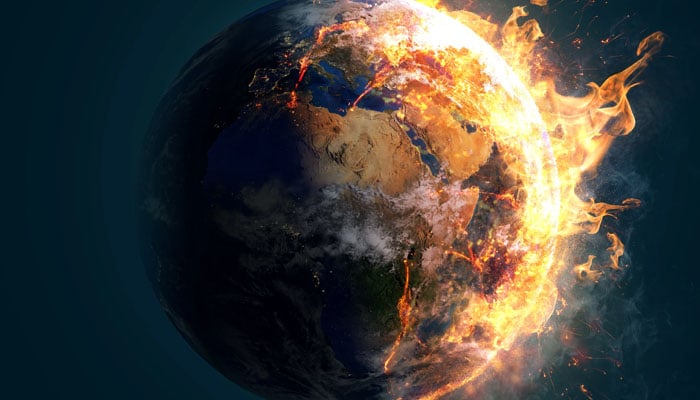Doomsday Alert: Humans given scientifically predicted extinction date — But it can be delayed
This supposed extinction event will be first since an asteroid wiped out dinosaurs on Earth 66 million years ago
Scientists have predicted that humans will be wiped off the face of Earth in 250 million years, but only if private corporations immediately stop burning fossil fuels and if they don't do it then this mass extinction could happen way earlier than thought.
All mammals will go extinct, according to University of Bristol researchers.
They assert that any lifeforms still existing on Earth at this period would have to adapt to temperatures ranging from 104°F to 158°F (40°C to 70°C).
The timing of our extinction will probably be even earlier because their calculations don't take into consideration the greenhouse gases produced by burning fossil fuels and other human-caused causes.
It would be the first major extinction since 66 million years ago when a huge asteroid struck the Earth and wiped off the dinosaurs.
Dr Alexander Farnsworth, a senior research associate in the School of Geographical Sciences at the University of Bristol, served as the study's principal investigator.
"The outlook in the distant future appears very bleak," Dr Farnsworth said.
"Carbon dioxide levels could be double current levels."
"Humans – along with many other species – would expire due to their inability to shed this heat through sweat, cooling their bodies."
The experts predict that in 250 million years, all of Earth's continents will have merged to form Pangea Ultima, a supercontinent.
All that would be left of the once-powerful Atlantic Ocean would be an inland sea in the centre of Earth's landmass.
The majority of the Earth's surface would be covered by the nearby Pacific Ocean.
One proposed model for the supercontinent that will emerge from the convergence of the plate tectonics is Pangea Ultima.
Scientists are confident that the Earth's continents will gradually converge to form one hot, arid, and generally inhospitable mass, regardless of the precise alignment.
The continents coming closer through tectonic processes in the Earth's crust would cause more frequent volcanic eruptions, which would result in massive releases of carbon dioxide (CO2) into the atmosphere and further warm the planet.
Additionally, the natural brightness of the sun, which is progressively heating up the planets, is another less well-known kind of global warming.
"The newly-emerged supercontinent would effectively create a triple whammy, comprising the continentality effect, hotter sun and more CO2 in the atmosphere, of increasing heat for much of the planet," said Dr Farnsworth.
"The result is a mostly hostile environment devoid of food and water sources for mammals."
"Widespread temperatures of between 40 to 50 degrees Celsius, and even greater daily extremes, compounded by high levels of humidity would ultimately seal our fate."
The researchers simulated temperature, wind, rain, and humidity patterns for Pangea Ultima using computerised climate models.
The scientists mapped out CO2 inputs and outputs using models of tectonic plate movement, ocean chemistry, and other factors in order to anticipate the level of CO2 in the future.
Researchers emphasise that they did not account for CO2 emissions from burning fossil fuels, which are frequently recognised as the primary driver of current climate change.
-
Shanghai Fusion ‘Artificial Sun’ achieves groundbreaking results with plasma control record
-
Polar vortex ‘exceptional’ disruption: Rare shift signals extreme February winter
-
Netherlands repatriates 3500-year-old Egyptian sculpture looted during Arab Spring
-
Archaeologists recreate 3,500-year-old Egyptian perfumes for modern museums
-
Smartphones in orbit? NASA’s Crew-12 and Artemis II missions to use latest mobile tech
-
Rare deep-sea discovery: ‘School bus-size’ phantom jellyfish spotted in Argentina
-
NASA eyes March moon mission launch following test run setbacks
-
February offers 8 must-see sky events including rare eclipse and planet parade












